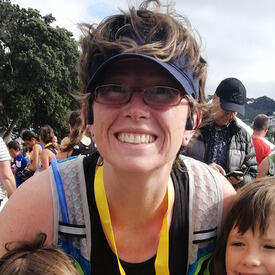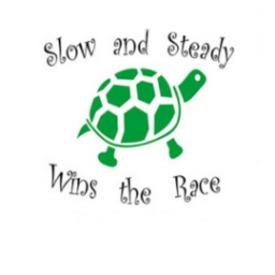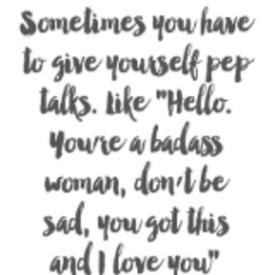Can Too Much Health Tracking Actually Hurt You?
Options

Bry_Fitness70
Posts: 2,481 Member
https://runnersworld.com/wearable-tech/can-too-much-health-tracking-hurt-you?
In my case – no, absolutely not. Fitness trackers are just measuring and providing data. If people use this data to go overboard and it makes them miserable, the problem isn’t with the electronic device.
In my case – no, absolutely not. Fitness trackers are just measuring and providing data. If people use this data to go overboard and it makes them miserable, the problem isn’t with the electronic device.
5
Replies
-
Ok, you've had plenty of time to think it over...
 3
3 -
It's the same concept as the scale: if you attach emotion and self-worth to the number then it can definitely be a bad thing. For some people fitness trackers become an unhealthy obsession. Many people use them with no issues at all. It's all very individualized, I'd think.4
-
I'm one of the people who really likes my tracker.
It's important to remember that lots of the metrics are *really* inaccurate, especially when it comes to measuring sleep. I've heard from a physician friend that people are working themselves into (previously nonexistent) sleep disorders because their tracker keeps telling them that they're not getting enough sleep.3 -
I'll let you know...I just ordered a charge 2...need to see what all the fuss is about. My guess is probably not for myself...but I know people who do all kinds of wackiness with the data being presented to them...0
-
michellebirtleeds wrote: »I'm one of the people who really likes my tracker.
It's important to remember that lots of the metrics are *really* inaccurate, especially when it comes to measuring sleep. I've heard from a physician friend that people are working themselves into (previously nonexistent) sleep disorders because their tracker keeps telling them that they're not getting enough sleep.
I have a Garmin Fenix 3 HR, and the sleep duration is always correct in total hours (my movement and HR determine when I fall asleep and wake up accurately. The distribution between "light" and "deep" isn't really that useful to me, as I don't know how I could make myself sleep any deeper, all I can really try to control is the duration. I'm not sure how any of this type of data could trigger a sleeping disorder.0 -
Bry_Fitness70 wrote: »I'm not sure how any of this type of data could trigger a sleeping disorder.
People get anxious about not getting enough sleep, which damages their ability to sleep.
3 -
The data mattered when i first started and if the dang thing did not sync over I dd panic. But I was pretty clueless about most everything when I first started, and I need to be on point with everything.
Four years in, I use my Garmin Forerunner for some basic data points, but I don't worry over it any more. The stuff I use my watch for now is pretty basic and at a glance, no need to sit and analyze data and numbers for hours at time.
I won't it against anyone that feels very attached to it, especially the beginning of their journey or if using it for health/medical reason. Their relationship with this gadget or any other gadget like a body weight scale may be a tell tell sign but I can't speak for anyone else.1 -
michellebirtleeds wrote: »Bry_Fitness70 wrote: »I'm not sure how any of this type of data could trigger a sleeping disorder.
People get anxious about not getting enough sleep, which damages their ability to sleep.
I'm just trying to understand how that works - if my tracker measures 7 hours of sleep and I feel I need 8, don't I just go to bed an hour earlier / wake up an hour later? I think that there must be some other issues going on for a person to experience a high level of anxiety over something like that.2 -
Bry_Fitness70 wrote: »michellebirtleeds wrote: »I'm one of the people who really likes my tracker.
It's important to remember that lots of the metrics are *really* inaccurate, especially when it comes to measuring sleep. I've heard from a physician friend that people are working themselves into (previously nonexistent) sleep disorders because their tracker keeps telling them that they're not getting enough sleep.
I have a Garmin Fenix 3 HR, and the sleep duration is always correct in total hours (my movement and HR determine when I fall asleep and wake up accurately. The distribution between "light" and "deep" isn't really that useful to me, as I don't know how I could make myself sleep any deeper, all I can really try to control is the duration. I'm not sure how any of this type of data could trigger a sleeping disorder.
And, people thinking they have a sleep disorder based on a device that measures arm movements rather than clinical sleep cycles.
I love my fitbit for steps and floors, but the sleep monitoring is woo compared to true sleep analysis .3 -
Bry_Fitness70 wrote: »michellebirtleeds wrote: »Bry_Fitness70 wrote: »I'm not sure how any of this type of data could trigger a sleeping disorder.
People get anxious about not getting enough sleep, which damages their ability to sleep.
I'm just trying to understand how that works - if my tracker measures 7 hours of sleep and I feel I need 8, don't I just go to bed an hour earlier / wake up an hour later? I think that there must be some other issues going on for a person to experience a high level of anxiety over something like that.
Anxiety, and what triggers it, can be very personal/individual. It can also be exacerbated by a lack of perspective/understanding.0 -
Bry_Fitness70 wrote: »michellebirtleeds wrote: »Bry_Fitness70 wrote: »I'm not sure how any of this type of data could trigger a sleeping disorder.
People get anxious about not getting enough sleep, which damages their ability to sleep.
I'm just trying to understand how that works - if my tracker measures 7 hours of sleep and I feel I need 8, don't I just go to bed an hour earlier / wake up an hour later? I think that there must be some other issues going on for a person to experience a high level of anxiety over something like that.
I have a friend who will quite literally create something to worry about out of thin air if life is going to smoothly...yes, he's in counseling.
One of these trackers would likely kill him I think...2 -
Bry_Fitness70 wrote: »michellebirtleeds wrote: »I'm one of the people who really likes my tracker.
It's important to remember that lots of the metrics are *really* inaccurate, especially when it comes to measuring sleep. I've heard from a physician friend that people are working themselves into (previously nonexistent) sleep disorders because their tracker keeps telling them that they're not getting enough sleep.
I have a Garmin Fenix 3 HR, and the sleep duration is always correct in total hours (my movement and HR determine when I fall asleep and wake up accurately. The distribution between "light" and "deep" isn't really that useful to me, as I don't know how I could make myself sleep any deeper, all I can really try to control is the duration. I'm not sure how any of this type of data could trigger a sleeping disorder.
See mine (same watch) had me falling asleep at 8 last night. Now I was in bed, but was watching TV until 9. So even the total hours is off by a bit for me (for last night anyway).
It's data. I'm not attached to it.0 -
I think it can easily turn into information overload, especially for people (which is the majority of the public) who aren't educated in what is good information, and what is data, and how to use that data.
Other than a food/calorie tracker, and their basic exercise tracker, until very recently I never had more than that, and that information was plenty for me to lose weight and feel great.
I recently got a chest HRM and the app(s) that go with it, but for a purpose - I want to know if my gym workouts (which I should have a good data set on once race season starts) are helping my race needs, or if they could use some tweaks to make them more effective. I plan to wear the HRM while racing to see where things are, how often, what my expenditure is during a race, and then adjust my training so my fitness can help me get to my goals and won't be holding me back.1 -
This content has been removed.
-
Bry_Fitness70 wrote: »https://runnersworld.com/wearable-tech/can-too-much-health-tracking-hurt-you?
In my case – no, absolutely not. Fitness trackers are just measuring and providing data. If people use this data to go overboard and it makes them miserable, the problem isn’t with the electronic device.Bry_Fitness70 wrote: »Ok, you've had plenty of time to think it over... Bry_Fitness70 wrote: »I'm not sure how any of this type of data could trigger a sleeping disorder.
Bry_Fitness70 wrote: »I'm not sure how any of this type of data could trigger a sleeping disorder.
Your first post was at 2:41 am ... the second at 5:44 am.
Speaking of sleep ... that's what I was doing between those hours. Not "thinking it over".
5 -
Using a tracker has reduced my anxiety. I’ve had mine for a few years now and they (yes, more than one) have proven to be accurate enough for me to trust the numbers they provide. Nothing is 100% but having some sort of consistent estimate is better than a wild stab in the dark or using nothing at all. I no longer wonder if I should count x, y, z or do half or why am I so hungry or am I adequately fueling for my runs based on whatever else I have going on in my life. Problem solved.
I also find them to be helpful in getting me to move at times when I typically wouldn’t (but should). And I enjoy the step challenges, but I’m not going to spend hours of my day doing laps of my dining room table to get a specific step count or beat someone else.
But as with everything-to each his or her own and everyone needs to find what works for, and is healthy (mentally and physically) for them.2 -
michellebirtleeds wrote: »I'm one of the people who really likes my tracker.
It's important to remember that lots of the metrics are *really* inaccurate, especially when it comes to measuring sleep. I've heard from a physician friend that people are working themselves into (previously nonexistent) sleep disorders because their tracker keeps telling them that they're not getting enough sleep.
I have a Garmin 935 and I'm actually pretty amazed by how accurate the sleep tracker is (at least as far as tracking when I fall asleep and when I wake up). I realize that the delineations of 'deep' and 'light' sleep are derived from algorithms, most likely (I assume) based upon heart rate and how much movement the accelerometer is detecting - but as far as hours of sleep it's usually accurate to within 5-10 minutes, which is plenty close enough for me.
As far as the activity/workout tracking - I fully understand there's a margin of error which can be anywhere from slight to considerable depending upon what I'm doing. Don't care. I like data, numbers, graphs and stuff and even if they're limited in the accuracy of what they're purporting to show, they're fun to look at and play with. Assuming that the rate of error is fairly constant for the similar activities I do, they can still be useful to (roughly) track progress, training status, etc. With that said, I don't obsess over them and they don't cause me any stress because I don't assign an importance to them that they don't deserve.
On the flip side of the coin, there are plenty of people who freak the hell out and go right off the deep end over a 0.1 pound fluctuation in their scale weight - I can see where, for obsessive/highly stressed people like that (these are the people who post threads with titles in ALL CAPS and lots of exclamation points and question marks), trackers could cause a considerable amount of stress and anxiety because they don't understand how to interpret the numbers or what they mean (or don't mean).1 -
Bry_Fitness70 wrote: »https://runnersworld.com/wearable-tech/can-too-much-health-tracking-hurt-you?
In my case – no, absolutely not. Fitness trackers are just measuring and providing data. If people use this data to go overboard and it makes them miserable, the problem isn’t with the electronic device.Bry_Fitness70 wrote: »Ok, you've had plenty of time to think it over... Bry_Fitness70 wrote: »I'm not sure how any of this type of data could trigger a sleeping disorder.
Bry_Fitness70 wrote: »I'm not sure how any of this type of data could trigger a sleeping disorder.
Your first post was at 2:41 am ... the second at 5:44 am.
Speaking of sleep ... that's what I was doing between those hours. Not "thinking it over".
I was just sad and filled with anxiety because no one was responding to my post, so that was my way of bumping it cwolfman13 wrote: »Bry_Fitness70 wrote: »michellebirtleeds wrote: »Bry_Fitness70 wrote: »I'm not sure how any of this type of data could trigger a sleeping disorder.
cwolfman13 wrote: »Bry_Fitness70 wrote: »michellebirtleeds wrote: »Bry_Fitness70 wrote: »I'm not sure how any of this type of data could trigger a sleeping disorder.
People get anxious about not getting enough sleep, which damages their ability to sleep.
I'm just trying to understand how that works - if my tracker measures 7 hours of sleep and I feel I need 8, don't I just go to bed an hour earlier / wake up an hour later? I think that there must be some other issues going on for a person to experience a high level of anxiety over something like that.
I have a friend who will quite literally create something to worry about out of thin air if life is going to smoothly...yes, he's in counseling.
One of these trackers would likely kill him I think...
Yeah, unfortunately for people who find anxiety everywhere, a fitness tracker is just another trigger. Which has nothing to do with fitness tracker use in general.
0 -
I love my apple watch (and loved my fitbit). It helps me stay motivated. I see numbers. If they aren't the ones I want to see, I usually do something about it. Closing rings on the apple watch is oddly satisfying, as is getting the little achievement medals.1
-
Bumped this.
All of the food prepping, planning and learning, introspecting and studying in the world means nothing if you don't do something.
Basic data points and stats are just a way to make sure you have enough fuel in your tank. You don't want to run down the highway on empty. Keeping a log is a valuable tool - like how often you change oil, filters and rotate tires on vehicles.
Too much dieting information is where the real mind warp comes in. I threw all dieting plans out the window. I'm not buying anymore self-help dieting books with wild claims of a miracle cure. Many are written by those who have disordered thinking about food or an actual food disorder. They've compartmentalized food for you in such a way that it justifies their own eating disorder. The more rigid their rules and regulations for every area of their life, it can lend itself to you taking on their eating disorder through the bias of their mind - if you're so easily led.
I'm not.0 -
I personally don't own a FitBit or fitness tracker of any sort, but I do track my macros to a T. I weigh and measure all my food to ensure I get all macro and micronutrients on a daily basis. This is what I've done for forever, I enjoy it, it isn't a chore or nuisance to me and I have a good mind set surrounding it. I would say I feel like it isn't possible to "track too much" however I just got back from an elongated stay in Italy, where I went "cold turkey" with work outs and tracking..I figured I'd let myself enjoy the break and eat however I please, not stress about daily work outs and lifts, etc. By week two, I was getting sick every day, multiple times a day. I was not actually sick, just how my body responded to the surplus of carbs and massive decrease in protein (I went from intaking 200g on a daily basis with under 75g carbs to probably 200g+ carbs and under 75g protein). I wasn't drinking alcohol, I wasn't sick, so that was really the only explanation. This made me realize that maybe long term tracking is a little more dangerous that I had originally thought..at least from a change of pace stand point. Besides that, I think it really depends on the mind set surrounding these trackers. Some people are pushed to be more active and compete and it's a good thing. Personally, I know when I'm pushing myself and if I ever got a FitBit (which I probably never will) it would simply be out of curiosity since I go so hard all the time anyway.0
-
For anyone interested in this subject I HIGHLY highly suggest reading the book "Unplugged" by several reputable authors. I'm half way through the book and it's really eye opening.0
-
Bry_Fitness70 wrote: »https://runnersworld.com/wearable-tech/can-too-much-health-tracking-hurt-you?
In my case – no, absolutely not. Fitness trackers are just measuring and providing data. If people use this data to go overboard and it makes them miserable, the problem isn’t with the electronic device.Bry_Fitness70 wrote: »Ok, you've had plenty of time to think it over... Bry_Fitness70 wrote: »I'm not sure how any of this type of data could trigger a sleeping disorder.
Bry_Fitness70 wrote: »I'm not sure how any of this type of data could trigger a sleeping disorder.
Your first post was at 2:41 am ... the second at 5:44 am.
Speaking of sleep ... that's what I was doing between those hours. Not "thinking it over".
You cant really go by what time someone posts unless you know exactly where in the world they are. I live in NZ so you all post at really odd hours to me!2 -
For me I have a couple of goals I stick to such steps per day, I like to get my 10k, but wont do anything too drastic, does walking on the spot if I'm at 9500 at bedtime count as drastic? I also aim to burn around 2200 calories - now I know the accuracy can be off, but its a guide and better than nothing. I dont do anything special if I dont get to the calorie burn, unlike the steps, but I find if I do 10k steps, i burn 2200 anyway so...0
-
I'm not really a slave to my devices and metrics, unless you consider someone who hops on his bike at 9pm to crank out a 3hr indoor trainer ride before midnight to meet the daily workout plan to be a bit "over the top"
 2
2 -
I miss my smartwatch so much! It died a couple months ago after almost 4 years of being awesome. Now I'm saving up gift cards to buy whatever is the best of the new ones in the fall.0
-
Only during dead week (finals).0
-
Duck_Puddle wrote: »Using a tracker has reduced my anxiety. I’ve had mine for a few years now and they (yes, more than one) have proven to be accurate enough for me to trust the numbers they provide. Nothing is 100% but having some sort of consistent estimate is better than a wild stab in the dark or using nothing at all. I no longer wonder if I should count x, y, z or do half or why am I so hungry or am I adequately fueling for my runs based on whatever else I have going on in my life. Problem solved.
I also find them to be helpful in getting me to move at times when I typically wouldn’t (but should). And I enjoy the step challenges, but I’m not going to spend hours of my day doing laps of my dining room table to get a specific step count or beat someone else.
But as with everything-to each his or her own and everyone needs to find what works for, and is healthy (mentally and physically) for them.
I’m with Duck_Puddle here. With my tracker (Fitbit Alta HR) I get consistent data. Comparing the activity data from my fitbit to my weight data to my food logs, all numbers match. I don’t know, or even care, if they are accurate compared to absolute values, but they are consistent compared to themselves and each other, and having these functioning data sets helps me a) estimate future results b) spot any irregularities and causalities, helping me do better and avoid regrettable choices.
0 -
I don't log foods anymore and haven't for months and have been maintaining......but seeing all my data on my Garmin keeps me honest with myself.0
This discussion has been closed.
Categories
- All Categories
- 1.4M Health, Wellness and Goals
- 396.8K Introduce Yourself
- 44.2K Getting Started
- 260.9K Health and Weight Loss
- 176.3K Food and Nutrition
- 47.6K Recipes
- 232.8K Fitness and Exercise
- 450 Sleep, Mindfulness and Overall Wellness
- 6.5K Goal: Maintaining Weight
- 8.7K Goal: Gaining Weight and Body Building
- 153.3K Motivation and Support
- 8.3K Challenges
- 1.3K Debate Club
- 96.5K Chit-Chat
- 2.6K Fun and Games
- 4.5K MyFitnessPal Information
- 16 News and Announcements
- 18 MyFitnessPal Academy
- 1.4K Feature Suggestions and Ideas
- 3.1K MyFitnessPal Tech Support Questions




















